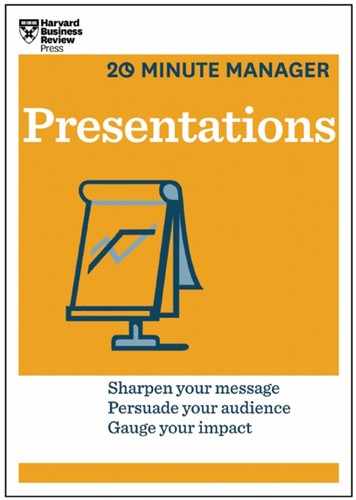You wrapped up your presentation by outlining next steps for the audience. Of course, you’ll follow through on your end of those commitments (see the next chapter, “Follow Up with the Audience”). But you also have an obligation to honestly assess the talk you just gave and to sharpen your skills before your next one.
Critiquing your content
No matter how well you’ve planned your presentation, the act of delivering it will often expose flaws, gaps, or other shortcomings, even if you’re a polished presenter.
You may discover small glitches, such as a slide that could not be read from the back of the room, or bigger ones, like a missing step in a process you outlined. Make a list of those flaws as soon as possible—no more than an hour or two after your presentation ends, if that’s feasible. Incorporate the changes into your slides and other master files within a few days. Trying to reconstruct and correct the problems weeks or months later almost always yields worse results, if you remember to fix the mistakes at all.
Analyzing your performance
Problems with delivery run the gamut. You can easily identify minor ones, such as weak opening remarks and awkward attempts at humor, the moment they happen. Just look at the audience’s reaction: Are people nodding? Or is everyone sitting dead still? Watching a video recording of the event will also help you see trouble spots. Think of specific fixes for next time, and write them down.
If you ran into technical problems, they may have thrown your whole talk off track, but those, too, are relatively simple to fix. Perhaps you really didn’t know how to use the projector, and that slowed you down or made you fumble. Learn how to use it for next time. Enlist an assistant if appropriate.
Chronic issues, such as your general comfort level and skill in delivery, require more work. If you felt very nervous the entire time (not just during the first few minutes) or if you found yourself clinging to notes or stammering despite having rehearsed thoroughly, you may need some coaching.
Asking colleagues for feedback
If trusted coworkers were in the audience, tap them for advice on how to improve your presentation and on how to become a better presenter. Set up one-on-one meetings to receive that feedback. A quick “How did I do?” in the corridor is likely to generate a polite, perhaps less than honest, response, particularly if other people are within earshot. Your meetings with your colleagues should be brief and informal, but don’t be afraid to ask for people’s frank reactions to both the content and the delivery of your presentation.
It takes a long time to master presentation skills. But if you continuously work to improve, your presentations will become more and more effective, and your standing with your audiences will rise.
